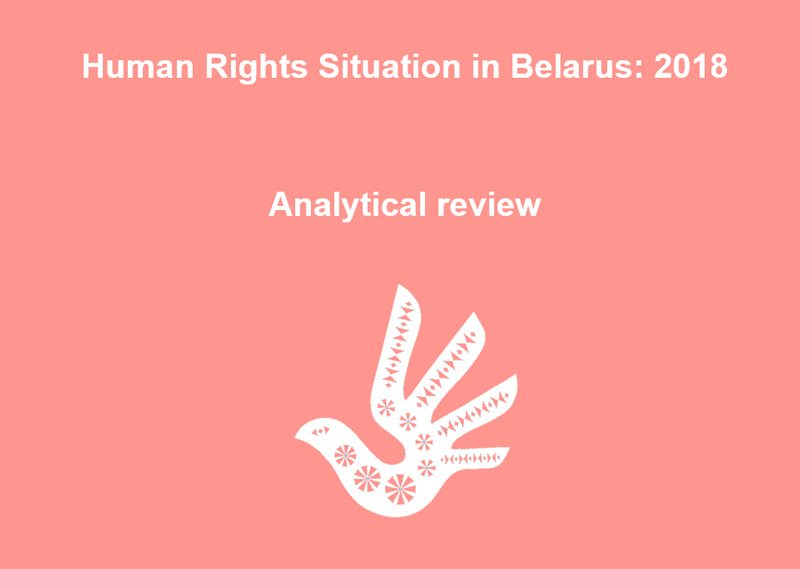Human Rights Situation in Belarus: 2018 Document
https://spring96.org/en/news/91748
2019
2019-01-05T13:34:38+0300
2019-01-05T13:34:38+0300
2019-01-05T13:34:38+0300
en
https://spring96.org/files/images/sources/review_2018_en_1.jpg
The Human Rights Center “Viasna”
The Human Rights Center “Viasna”
The Human Rights Center “Viasna”
The Human Rights Center “Viasna”
Summary:
- despite a decline in the overall level of repression in the country compared to the previous year, in 2018, there were no systemic changes in the area of civil and political rights, especially at the legislative level, aimed at the qualitative improvement of the human rights situation in Belarus;
- by submitting a report to the UN Human Rights Committee on the implementation of the ICCPR over the last 20 years, Belarus completely paid of the debts to the UN treaty bodies. However, the government’s refusal to implement the views adopted by the HRC on individual communications of Belarusian nationals, as well as other procedures, including interim measures, enforced by the Committee suggests Belarus’s selective cooperation with the UN and a failure to fully implement the commitments voluntarily undertaken by the country in the field of human rights;
- despite the absence of significant socio-political events, the authorities continued the practice of politically motivated prosecution. According to the Human Rights Center "Viasna", in 2018, this type of repression was used against 18 people. 15 of them were charged in the so-called “BelTA case” opened under Part 2, Art. 349 of the Criminal Code (illegal access to computer information committed out of personal interest that caused significant damage) against a number of journalists and editors of several independent media; activists of the independent trade union REP, Henadz Fiadynich and Ihar Komlik, and director of the BelaPAN news agency Ales Lipai were charged under Part 2, Art. 243 of the Criminal Code (evasion of taxes on a large scale);
- during the year, criminal proceedings against 14 defendants in the “BelTA case” were terminated, and the defendants were prosecuted under administrative procedures. However, the criminal case under Part 2, Art. 425 of the Criminal Code (failure to act as an official) against chief editor of TUT.BY Maryna Zolatava was not closed. Henadz Fiadynich and Ihar Komlik were sentenced to 4 years of restraint of liberty without imprisonment without confiscation of property and the prohibition to hold managerial positions for the period of 5 years. The criminal case against Ales Lipai was closed in connection with his death;
- as of late 2018, political prisoner Mikhail Zhamchuzhny continued to serve his sentence in prison, facing ongoing harassment by the prison administration throughout the year;
- in 2018, the situation with the rights to personal integrity, freedom from torture, cruel, inhuman and degrading treatment did not significantly change;
- during the year, there were 184 documented cases of administrative convictions for participation in unsanctioned meetings involving 144 persons: 21 sentences of detention were imposed, and fines were handed down in 163 cases totaling 106,893.5 rubles;
- during the year, there were numerous cases of persecution of bloggers and journalists of independent media in connection with the exercise of their professional activities. According to the Human Rights Center "Viasna", 36 journalists were convicted in 132 cases of administrative persecution resulting in fines for cooperation with foreign media (with a total of 113,092 rubles). Changes in the Law on Mass Media, which entered into force, significantly restricted freedom of speech and imposed new restrictions on online publications;
- cases of pressure on human rights defenders in connection with the exercise of their human rights activities were documented;
- despite the continuation of the country’s dialogues with the EU and the PACE on the issue of the death penalty and repeated calls for a moratorium on executions, during the year Belarus continued to use of this kind of punishment. In 2018, two new death sentences were handed down, and four previously convicted prisoners were executed;
- Belarus continued to demonstrate violations of the right to freedom of conscience and religion: religious communities still faced excessive requirements in registration; activities of religious communities without registration were prohibited; law excessively restricts the rights of believers and their associations operating without legal justification;
- in 2018, the authorities began the practical application of the provisions of the new version of Presidential Decree number 3 (as amended by Presidential Decree number 1 of 12 January, 2018). The newly created electronic database included information of more than 500,000 citizens who are “not employed in the economy.” In 2019, these citizens will pay the full cost of certain types of utility bills (from February 1 — hot water, from October 1 — gas and heating). Among other things, local commissions formed to enforce the Decree were empowered to send citizens “leading an antisocial way of life” to the LTPs (labor and therapy profilactoria). The new version of the Decree triggered criticism from human rights and trade union organizations in the country;
- during the year, the authorities continued to use forced labor in forms that have become traditional for Belarus: isolation in the LTPs, “obliged persons”, involvement, by the orders of local executive committees, of employees of state-owned enterprises and students in harvesting agricultural products, participating in unpaid cleanups, etc.
Human Rights Situation in Belarus: 2018
Files
- review_2018_en.pdf (0.76 Mb)


















